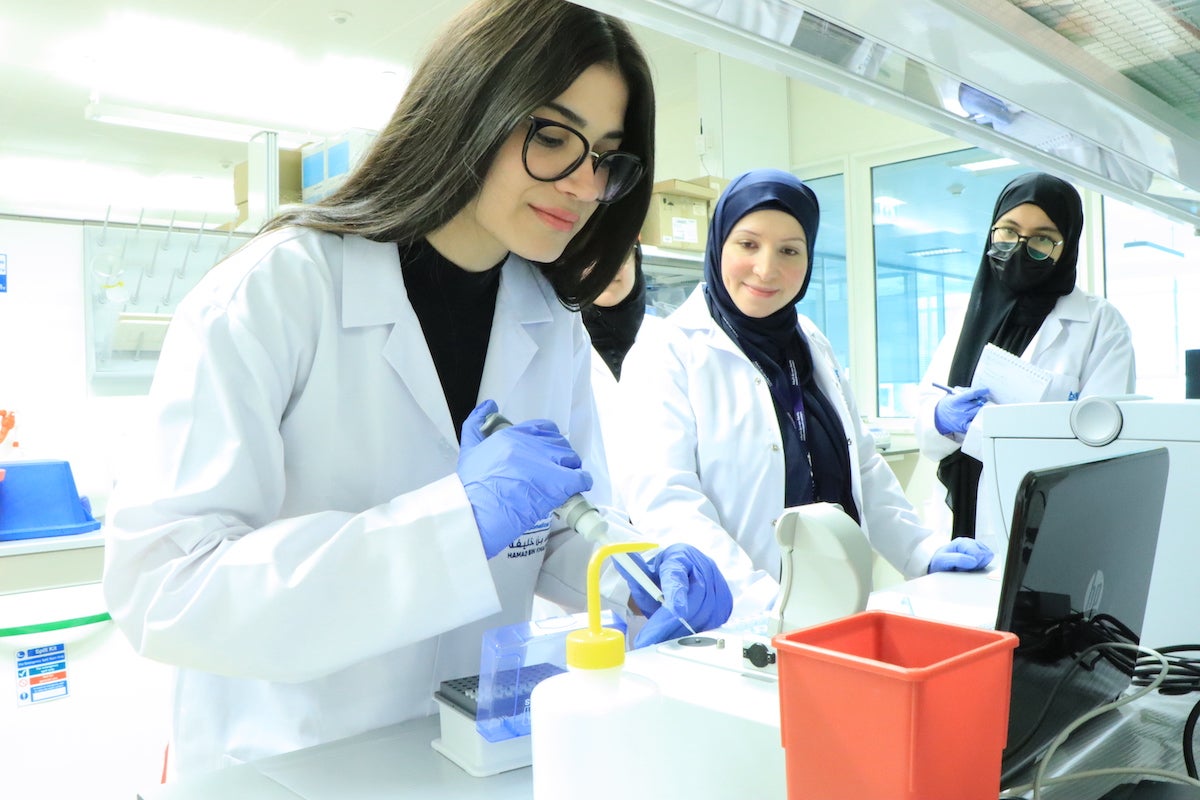Qatar-led COVID-19 Study Reveals Impressive Results

Qatar Biomedical Research Institute (QBRI) has succeeded in building strategic collaborative efforts with world-renowned institutions and stakeholders in Qatar, as well as leading scientists and centers of excellence around the world. These strategic partnerships support the development of QBRI’s programs and research efforts - in addition to building its scientific capacity - while engaging in groundbreaking research at the frontiers of biology, medicine, biomarkers, drug development, translational medicine, and personalized healthcare.
The abundance of data generated and collected through these collaborations supports QBRI’s scientific research and enables the institute to pursue breakthrough discoveries to better understand diseases.
For example, QBRI published a cooperative study titled ‘Age, Disease Severity and Ethnicity Influence Humoral Responses in a Multi-Ethnic COVID-19 Cohort’, which aimed to understand how age and ethnic differences may play a role in the disease severity of COVID-19.
This international collaboration featured cohorts from Qatar, Malaysia, South Africa, and involved partners including Hamad Medical Corporation, Anti-Doping Laboratory Qatar, Qatar Red Crescent, University of Cape Town, Charlotte Maxeke Johannesburg Academic Hospital, Institute for Medical Research in Malaysia, University of the Witwatersrand in Johannesburg and the industrial partner Sengenics Corporation.
QRBI has an active ongoing collaboration with Sengenics and has established a new platform in its proteomics core facility to transfer the technology and make it available to its local scientists.
Dr. Jonathan Blackburn, Chief Scientific Officer, Sengenics, noted: “Our valued partnership with QBRI has helped to further elucidate the humoral immune response to viral antigens within naturally infected populations.”
“Sengenics developed a quantitative SARS-CoV-2 specific multi-epitope protein microarray platform that enabled us to assess the influence of disease severity, age, and ethnicity on the strength and breadth of the antibody response against the nucleocapsid protein of SARS-CoV-2,” said Dr. Houari Boumediene Abdesselem, Laboratory Manager, QBRI.
“Multi-ethnic cohorts of COVID-19 patients and control subjects from Qatar were collected by Hamad Medical Corporation, Anti-Doping Laboratory Qatar, and Qatar Red Crescent, to be analyzed using the newly developed SARS-Cov-2 Sengenics technology, and were compared to different international cohorts,” said Dr. Maryam Ali Al-Nesf Al-Mansouri, Senior Consultant at Hamad Medical Corporation.
Dr. Omar El Agnaf, Executive Director, QBRI, said: “As expected, patients with severe disease showed significantly higher antibody titers and significantly broader epitope coverage.” He added: “Additionally, we observed vast differences in the breadth and strength of the humoral immune response in relation to ethnicity, which may reflect differences in genetic and lifestyle factors,” he added.
Some of the results of the study were more unexpected, said Dr. El Agnaf. “In a classical sense, older individuals are observed to be more susceptible to new infections, due to impairment of adaptive immune responses, including immune repertoire exhaustion and deficiency in antigen-driven selection processes. However, we observed in our study a significant increase in antibody titers and SARS-CoV-2 epitope coverage with advancing age, in both mild and severe disease, which is encouraging for the effectiveness of vaccinations in elderly groups,” he said.
This study is part of a larger interdisciplinary program on COVID-19 that has been established at QBRI during the pandemic, according to Program Coordinator Dr. Julie Decock, a scientist at the Translational Cancer and Immunity Center at QBRI.
She said: “The overall goal of this program is to create a clinical impact in times of need, such as the current pandemic, and to foster preparedness for any future resurgences of SARS-CoV-2 or other viral infections in Qatar,” she added.
“More specifically, the program aims to identify biomarkers that can predict COVID-19 disease severity and long-lasting immunity against SARS-CoV-2 with potential implications for treatment guidance and vaccination strategies. The program also leverages the existing expertise from QBRI researchers in various disease settings to identify existing drugs that could be repurposed for the treatment of COVID-19 infection.”
The scientific and technological know-how acquired during these research activities will help QBRI researchers build capacity for research, development, and innovation in Qatar against coronaviruses. As such, in-house developed research tools and models to study COVID-19 infection may be used for future infectious disease research, thus playing a pivotal role in shaping the future of precision medicine in Qatar and the region.
The study was published in Viruses as part of its Special Issue: Coronaviruses Research in BRICS Countries.
Related News










